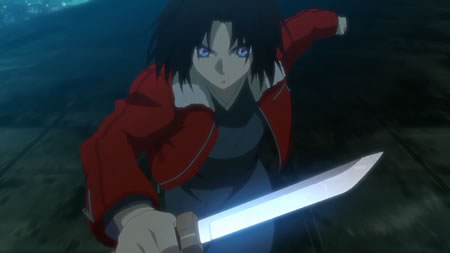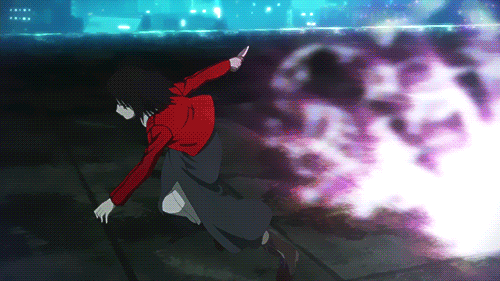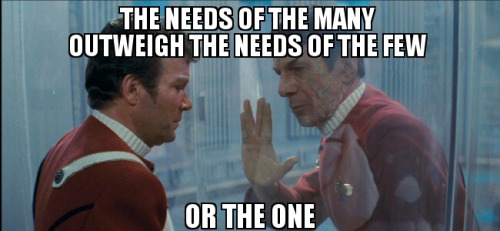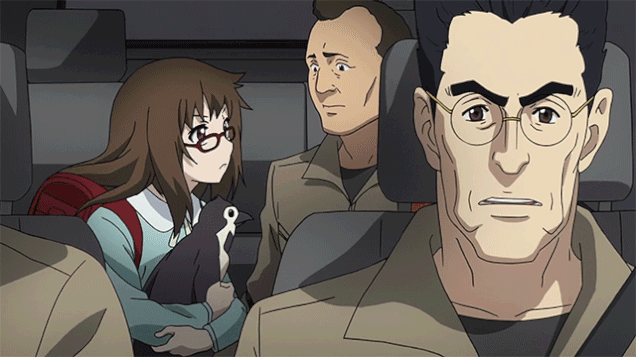← Back to Reviews
in

Kara no Kyoukai/Garden of Sinners:
Overlooking View
WHY'D I WATCH IT?
n/a
WHAT'D I THINK?
Kara no Kyoukai is a series of movies related to Type-Moon I’ve been meaning to watch.
Having now seen the first of the movies released out of chronological order, my impressions are heavily mixed.
Firstly, the movie looks fantastic. The gross majority of the budget seems to have been pumped into the background artwork, each of which could stand alone as an attractive illustration. The lighting is moody and appropriate and it combines well with fantastic animation which is consistent all throughout.
We’re introduced to the character, Shiki, who lives in an empty apartment, has a fridge consisting only of water bottles, wears unusually traditional clothing, and can apparently see ghosts. It’s revealed halfway through the movie that she also has a false doll arm, which appears to be part artificial and part organic tissue, which we’re informed can only move with the power of her soul. This character design is very interesting to me, and is honestly the whole reason I wanted to see these movies in the first place.
We’re offered two action sequences, the first in which Shiki wrestles with a ghost, and the second in which she kills a group of spirits with a dagger. The animation in these scenes, especially the latter is truly excellent and easily some of the most impressive I've seen considering it’s combination of camera angles, lighting, and water effects.

That about concludes my praise for the movie. Everything else about this movie is confusing, left intentionally vague, or just outright obnoxious in how meaningless it feels. At times it’s even insulting.
For the first third of the movie, Shiki is merely loitering around two characters who we’ll never really learn anything about while one of them pukes out exposition in riddlespeak and the other sits comatose for apparent lack of a soul.
As good as the animation is, very little is spent on these scenes, and most of what we learn about the plot comes from what little dialog we can divine from the characters and the plainer talk we get from overheard broadcasts. Apparently a series of suicides have occurred from a specific abandoned building in which young girls have, without apparent warning or connection to each other, jumped off the roof to their death.
We’re told this occurs no less than 8 times by the end of the movie, and yet this building is still left abandoned? Wouldn’t police be specifically staking out the roof by at least the third death by this point? We’re shown Shiki gets attacked when she wanders into the building, but it’s never mentioned on the broadcasts.
Shiki goes in, fights a ghost that possesses her arm, then she cuts off her arm, after which we watch stand around as the exposition fairy talks about dolls, arms, souls, emptiness, and whatever you think she might be talking about.
We have a scene in which Shiki eats Haagen Daz stawberry ice cream.
Very.
Very.
Slowly.
Shiki returns to the building, kills all the spirits with a dagger, because daggers can hurt spirits, and then suddenly some girl who looks like the main ghost wakes up in a hospital bed somewhere.
The exposition fairy visits her and they spend an insufferable amount of time talking back and forth in riddlespeak during which they conclude that “her soul was split into two bodies”, whatever the hell that means. There’s a LOT of dialog using very meaningful words like “floating”, “flying”, and “falling” to describe what I can only assume are things that makes sense in the context of the world they’re in, but not to the viewer.
The girl who we discover is blind (get it? OverLOOKing VIEW? GET IT? HAHAHAHA), goes up to the roof the abandoned building, where there are still no police and she presumably kills herself.
Shiki returns to the studio/apartment/place/location where the other two characters seem to just inhabit for no particular reason and we see the male character wake up, get the plot explained to him, say he doesn’t understand and then gets brushed off for not getting the “SIMPLE STORY”, which even after abbreviating makes no ****ing sense since we have no firmly established concept of what “floating”, “flying”, or “falling” are supposed to mean. I might attempt to extrapolate that these terms refer to different stages of death, such as limbo, heaven, or hell, or some such equivalent, but it wouldn’t explain the totally dead sections of the movie we waste on talking about “dolls”, “emptiness”, “souls splitting into two containers” or whatever the hell that was supposed to be.
You might think the movie ends here, but instead it just uselessly drones on for several more minutes while Shiki talks to the male character and we get spoonfed some really stupid message about suicide.
The beginning of the movie has the female character other than Shiki casually claim that suicide is selfish, and the end of the movie has the male character admit that suicide is a sign of weakness because it’s the easy way out and “requires less courage”. This altogether rubs me the wrong way even understanding Japan’s history with suicide.
To broadly paint suicide in such a manner oversimplifies any situation that may involve it. The given example even contradicts the message because it suggests that if you had a virus which would KILL EVERYONE AROUND YOU, the moral thing to do would be to NOT KILL YOURSELF.
What the hell kind of message is that? By no means am I suggesting that people are obligated to kill themselves if they get a deadly pandemic-level virus, but it blatantly says that it would be wrong for you to kill yourself if it would spare everyone. Isn’t that, in a word, SELFISH???

Of course, it would also be unfair to say that Spock was in any way obligated to kill himself to save the ship, but to suggest that it’s IMMORAL to do so just spits in the face of what few people who have committed suicide WITH GOOD ****IN’ REASONS.
The most transparent commentary this movie makes is simply that suicide is selfish, and that the girls apparently couldn’t be bothered to kill themselves in a way that didn’t wind up on the news is evidence of that. EVEN THOUGH it’s made pretty obvious they didn’t kill themselves, they were thrown off the roof by a friggin’ GHOST.
I get it, there are people who go out of there way to make a mess of things and take the easy way out because they don’t have the guts to deal with their trivial life problems, BUT THAT’S JUST THEM, that’s not everybody who’s ever killed themselves.
And I’m rather sick of having this argument with people in real life too. Whatever, where was I? An anime? ****, why the hell did this crap come up in an anime? Why couldn’t this movie have just been some badass anime version of Ghostbusters, huh?
Whoa, wait. That’s a thing?

The very last scene of this movie ends off with the male character delivering this profound bit of wisdom to our protagonist:
Excellent. Sexism. Roll credits.
What’d I say about this anime, I had “mixed feelings”? Screw that, I don’t like it. It’s slow, it’s boring, the only real fight scenes in the whole movie are one-sided, and it’s insulting.
Final Verdict: [Just... Bad]
Kara no Kyoukai/Garden of Sinners:
Overlooking View
Drama / 2007
WHY'D I WATCH IT?
n/a
WHAT'D I THINK?
Kara no Kyoukai is a series of movies related to Type-Moon I’ve been meaning to watch.
Having now seen the first of the movies released out of chronological order, my impressions are heavily mixed.
Firstly, the movie looks fantastic. The gross majority of the budget seems to have been pumped into the background artwork, each of which could stand alone as an attractive illustration. The lighting is moody and appropriate and it combines well with fantastic animation which is consistent all throughout.
We’re introduced to the character, Shiki, who lives in an empty apartment, has a fridge consisting only of water bottles, wears unusually traditional clothing, and can apparently see ghosts. It’s revealed halfway through the movie that she also has a false doll arm, which appears to be part artificial and part organic tissue, which we’re informed can only move with the power of her soul. This character design is very interesting to me, and is honestly the whole reason I wanted to see these movies in the first place.
We’re offered two action sequences, the first in which Shiki wrestles with a ghost, and the second in which she kills a group of spirits with a dagger. The animation in these scenes, especially the latter is truly excellent and easily some of the most impressive I've seen considering it’s combination of camera angles, lighting, and water effects.

That about concludes my praise for the movie. Everything else about this movie is confusing, left intentionally vague, or just outright obnoxious in how meaningless it feels. At times it’s even insulting.
For the first third of the movie, Shiki is merely loitering around two characters who we’ll never really learn anything about while one of them pukes out exposition in riddlespeak and the other sits comatose for apparent lack of a soul.
As good as the animation is, very little is spent on these scenes, and most of what we learn about the plot comes from what little dialog we can divine from the characters and the plainer talk we get from overheard broadcasts. Apparently a series of suicides have occurred from a specific abandoned building in which young girls have, without apparent warning or connection to each other, jumped off the roof to their death.
We’re told this occurs no less than 8 times by the end of the movie, and yet this building is still left abandoned? Wouldn’t police be specifically staking out the roof by at least the third death by this point? We’re shown Shiki gets attacked when she wanders into the building, but it’s never mentioned on the broadcasts.
Shiki goes in, fights a ghost that possesses her arm, then she cuts off her arm, after which we watch stand around as the exposition fairy talks about dolls, arms, souls, emptiness, and whatever you think she might be talking about.
We have a scene in which Shiki eats Haagen Daz stawberry ice cream.
Very.
Very.
Slowly.
Shiki returns to the building, kills all the spirits with a dagger, because daggers can hurt spirits, and then suddenly some girl who looks like the main ghost wakes up in a hospital bed somewhere.
The exposition fairy visits her and they spend an insufferable amount of time talking back and forth in riddlespeak during which they conclude that “her soul was split into two bodies”, whatever the hell that means. There’s a LOT of dialog using very meaningful words like “floating”, “flying”, and “falling” to describe what I can only assume are things that makes sense in the context of the world they’re in, but not to the viewer.
The girl who we discover is blind (get it? OverLOOKing VIEW? GET IT? HAHAHAHA), goes up to the roof the abandoned building, where there are still no police and she presumably kills herself.
Shiki returns to the studio/apartment/place/location where the other two characters seem to just inhabit for no particular reason and we see the male character wake up, get the plot explained to him, say he doesn’t understand and then gets brushed off for not getting the “SIMPLE STORY”, which even after abbreviating makes no ****ing sense since we have no firmly established concept of what “floating”, “flying”, or “falling” are supposed to mean. I might attempt to extrapolate that these terms refer to different stages of death, such as limbo, heaven, or hell, or some such equivalent, but it wouldn’t explain the totally dead sections of the movie we waste on talking about “dolls”, “emptiness”, “souls splitting into two containers” or whatever the hell that was supposed to be.
You might think the movie ends here, but instead it just uselessly drones on for several more minutes while Shiki talks to the male character and we get spoonfed some really stupid message about suicide.
The beginning of the movie has the female character other than Shiki casually claim that suicide is selfish, and the end of the movie has the male character admit that suicide is a sign of weakness because it’s the easy way out and “requires less courage”. This altogether rubs me the wrong way even understanding Japan’s history with suicide.
To broadly paint suicide in such a manner oversimplifies any situation that may involve it. The given example even contradicts the message because it suggests that if you had a virus which would KILL EVERYONE AROUND YOU, the moral thing to do would be to NOT KILL YOURSELF.
What the hell kind of message is that? By no means am I suggesting that people are obligated to kill themselves if they get a deadly pandemic-level virus, but it blatantly says that it would be wrong for you to kill yourself if it would spare everyone. Isn’t that, in a word, SELFISH???
Of course, it would also be unfair to say that Spock was in any way obligated to kill himself to save the ship, but to suggest that it’s IMMORAL to do so just spits in the face of what few people who have committed suicide WITH GOOD ****IN’ REASONS.
The most transparent commentary this movie makes is simply that suicide is selfish, and that the girls apparently couldn’t be bothered to kill themselves in a way that didn’t wind up on the news is evidence of that. EVEN THOUGH it’s made pretty obvious they didn’t kill themselves, they were thrown off the roof by a friggin’ GHOST.
I get it, there are people who go out of there way to make a mess of things and take the easy way out because they don’t have the guts to deal with their trivial life problems, BUT THAT’S JUST THEM, that’s not everybody who’s ever killed themselves.
And I’m rather sick of having this argument with people in real life too. Whatever, where was I? An anime? ****, why the hell did this crap come up in an anime? Why couldn’t this movie have just been some badass anime version of Ghostbusters, huh?
Whoa, wait. That’s a thing?

The very last scene of this movie ends off with the male character delivering this profound bit of wisdom to our protagonist:
Originally Posted by Character Whom I Can’t Be Bothered To Remember The Name Of
“Please do something about your crude language.
You’re a girl after all.”
You’re a girl after all.”
What’d I say about this anime, I had “mixed feelings”? Screw that, I don’t like it. It’s slow, it’s boring, the only real fight scenes in the whole movie are one-sided, and it’s insulting.
Final Verdict: [Just... Bad]
